- Home
- A. C. Crispin
Yesterday's Son
Yesterday's Son Read online
This book is a work of fiction. Names, characters, places and incidents are either the product of the author's imagination or are used fictitiously. Any resemblance to actual events or locales or persons, living or dead, is entirely coincidental.
An Original Publication of POCKET BOOKS
POCKET BOOKS, a division of Simon & Schuster Inc.
1230 Avenue of the Americas
New York, NY 10020
Visit us on the World Wide Web:
http://www.SimonSays.com/st
http://www.startrek.com
Copyright © 1990 by Paramount Pictures. All Rights Reserved.
STAR TREK is a Registered Trademark of Paramount Pictures.
This book is published by Pocket Books, a division of Simon & Schuster Inc, under exclusive license from Paramount Pictures.
All rights reserved, including the right to reproduce this book or portions thereof in any form whatsoever. For information address Pocket Books, 1230 Avenue of the Americas New York, NY 10020
ISBN: 0-7434-1962-6
POCKET and colophon are registered trademarks of Simon & Schuster Inc.
Table of Contents
Introduction
Prologue
Chapter 1
Chapter 2
Chapter 3
Chapter 4
Chapter 5
Chapter 6
Chapter 7
Chapter 8
Chapter 9
Chapter 10
Chapter 11
Chapter 12
Chapter 13
Chapter 14
Chapter 15
Chapter 16
Chapter 17
Chapter 18
Chapter 19
Epilogue
Look for STAR TREK fiction from Pocket Books
Dedicated to my two wonderful grandmothers,
with thanks for a lifetime of love and kindness;
and to my own son, Jason Paul Crispin
ACKNOWLEDGMENTS
I've always wanted to look at the acknowledgments page of a book someday and read: "I did it all myself!" But I couldn't say that here, because I owe many people thanks for their help in completing and marketing Yesterday's Son.
For their help in writing, editing, and proofing, my thanks to:
Debby Marshall, the best friend a writer ever had …
O'Malley, the Red Queen, ("Who cares, Ann? Nobody cares about a dumb detail like that; it doesn't advance the story. Out! Off with its head!"), who is a terrific editor—but don't ask her to spell …
Hope and George Tickell, my mother and father, who proofed and photocopied …
Faith E. Treadwell, my sister, who read and commented …
Jamie and Norman Jette, for the lesson in physics …
Sam R. Covington, for teaching me the value of research …
Robert B. and I. Lois Pleas, for well-considered comments on a stranger's work …
Beverly Volker, a fine editor, and a good person to Contact …
Randy L. Crispin, my husband, for giving me a reason to write …
Delma Frankel, that "deadeye" proofreader who turned out to be full of surprises …
And, for moral support and encouagement during the long years of uncertainty:
Andre Norton, who has enchanted so many people with uncountable wonders …
Jacqueline Lichtenberg, not only a good writer, but also a kind and gracious person who goes out of her way to help others get a start …
Anne Moroz, who finally found a safe place …
Teresa L. Bigbee, who puts up with writers and their attendant insanity with good grace, a sense of humor, and many helpful comments and suggestions …
Mary M. Schmidt, and Lynxie, of course …
Howard Weinstein, amateur psychotherapist, but truly a pro writer …
John McCall, professional fiction consultant, and a good one …
And, finally, a special acknowledgment to Shoshana (Susie) Hathaway, for giving me the idea, a long time ago, in a newly rediscovered Universe …
Introduction
Yesterday's Son
In the Author's Notes to my own STAR TREK novel, The Covenant of the Crown, I mentioned that I've made quite a few friends through STAR TREK, many of whom also want to be writers.
Ann Crispin is one of those friends, and Yesterday's Son, her first book, is a monument to patience.
I met Ann at the 1979 August Party Convention near Washington, D.C., where I'd unveiled the just-completed Covenant by reading chapters to audiences. Ann was verrrry pregnant at the time, and I think we bumped into each other (figuatively … or was it literaly?) in the typically crowded, incredibly slow convention elevator.
I really don't recall exactly what we talked about—that's no reflection on Ann, just the fact that much of my time at conventions is spent talking about writing. Many fans are excellent writers, trying to build up the nerve to submit their work professionally.
I'm not a parent, but I'd imagine that sending out your first would-be pro story is even worse than sending your child to the first day of kindergarten. After all, most kids survive their first day of school—very few get mailed back with rejection slips. But most first stories do meet that ignominious fate.
And so it is that many writers never get up the gumption to take that risk. By the time we met in the elevator, Ann had already submitted Yesterday's Son and, not having heard a word from Pocket Books, was getting anxious. Ann tells me she "hassled" me "rudely" for encouraging fans to try their hands at pro writing, insisting that previously unpublished writers wouldn't get the time of day from big-time publishers and editors.
It is with a great sigh of relief that I blow Ann a big Bronx cheer and say, "I told you so!"
Not that everyone can do what Ann has done—scoring with her first-ever pro submission. I like to share my own writing experiences, offering what's happened in my pursuit of this odd excuse for a career as an example. I was lucky enough to sell The Pirates of Orion to the animated STAR TREK TV series when I was 19 years old … and then I didn't sell anything for five years … five very sobering years.
So I'm no superstar writer. But I had a large enough ego to think I could tell stories well enough for other people to want to pay to read them. And if I could sell a story, maybe other semi-egotistical wishful thinkers can, too.
That's probably what I told Ann, and she listened—poor fool! She thought about it for a while, then called me several months later to talk some more. And called a few months after that … and a few months after that …
At that stage, I should point out, our commiseration had become mutual. While Ann was grinding her teeth and awaiting the life-or-death final word on her manuscript, I was going through seemingly endless delays in the publication of my already-purchased-and-paid-for STAR TREK book. Long-distance phone calls aren't cheap, but they're usually cheaper than psychiatry, so I figure I saved Ann a lot of money over those next couple of years.
And both our vigils had happy endings. Covenant came out in December 1981, and has been very well received. Several months after that, Ann got the word from Pocket Books—Yesterday's Son was "go for launch!"
In July 1982, Ann sent me a manuscript copy to read. After the first two chapters, I knew it was a winner. The rest of the book did not let me down. And I was convinced it should have its coming-out as my book did, having chapters read at a convention.
Quite frankly, Ann was chicken. She didn't think she should read it because no one would be able to hear the words over the racket caused by her chattering teeth. Secretly, I was glad—because that meant I would have the distinct pleasure of reading those opening chapters to a packed ballroom at Summer Media Fest '82 in Arlington, Virginia.
That audience loved wha
t they heard, but you are far luckier than they were … for you get to read the whole book, and you'll be glad you did!
Howard Weinstein
September 1982
P.S. If you write to Ann c/o Pocket Books, and you'd like an answer from her, please be sure to enclose a stamped, self-addressed envelope. New authors aren't rich enough to afford hundreds of return-postage stamps!
Prologue
Doctor McCoy picked up his rook and plunked it down again, taking one of his opponent's pawns. "Get out of that one if you can," he said, sitting back confidently. The man on the other side of the chessboard raised a quizzical eyebrow.
"An interesting move …" Spock conceded, and lapsed into an unmoving study of the board.
McCoy smiled. Spock had agreed to a game of the old-fashioned, two-dimensional chess when the Doctor suggested it. Now the Vulcan was discovering that McCoy's moves, though occasionally erratic, could be inspired, and a challenge to his logical mind. McCoy hadn't been captain of the chess team in med school for nothing.
While the First Officer mulled over his Queen's predicament, McCoy glanced idly around the recreation room. It was filled with crew members reading, playing cards or chess, or talking in groups. His gaze stopped on the face of a pretty young Ensign. The Doctor searched his mind for her name, recalled it. Teresa McNair. Straight out of the Academy, barely a day over twenty-three. Nice brown hair, green eyes. She had her nose in a micro-reader, scanning the material with careful scrutiny. As he watched, enjoying the long, slender legs curled up underneath her, she stopped the reader with a quick gesture and sat up. Tearing off two long strips of readout paper, she got up and walked straight toward him.
McCoy gave a guilty start, realizing he'd been staring, and turned away. A moment later, McNair appeared at Spock's elbow. "Excuse me, Mr. Spock."
The First Officer looked up. "Yes, Ensign?"
"Sir, would you please confirm a fact for me? I thought it was well-established that early Vulcan colonization was confined to the area closest to the Romulan Neutral Zone?" McNair's voice rose, making it a question.
"That's correct, Ensign." Spock was patience itself, but hardly inviting.
"Then do you know of any explanation for this?" She placed the large readout in front of the Vulcan and continued, "This photo came from archeological data published about the Beta Niobe system. That's clear at the other end of the explored portion of the Galaxy, and if there was no Vulcan colonization …" McNair sounded puzzled as she trailed off.
McCoy saw something flicker across Spock's face at the mention of Beta Niobe. He vainly tried to place it … no use, too many planets, too many suns. You had to be a biological computer like the Vulcan to remember half of them.
Spock scanned the sheet, eyes narrowed. The Doctor looked up at McNair. "Beta Niobe? Can't place it, but it sounds familiar."
The Ensign grinned at him and responded, "It should, Doctor. The Enterprise was the ship detailed to warn the people of Sarpeidon that Beta Niobe was ready to nova. I believe you were one of the landing party. There was a huge library complex on the planet. Our computers scanned and recorded the information in it before Sarpeidon was destroyed. The archeologial information I was studying came right out of the Atoz Library." She turned back to Spock, who was still studying the readout. "Neutron dating places the cave paintings you can see as circa 5,000 years old—Sarpeidon's last ice age. This is an enlargement of the face you can see on the left." She spread another sheet in front of the First Officer.
Spock leaned forward, face a carven mask, and McCoy was alerted by his complete withdrawal. The Doctor edged around in his seat to study the photos.
The one nearest him showed a cave wall, gray, with reddish highlights. The first painting was a hunting scene. Two figures—humanoid—faced two large creatures. One looked like a lion with a skinny neck and long fur. The other stood on its hind legs, and resembled a bear that had been made to order by a committee. Floppy ears, long snout—it should have looked comical, but not with a mouthful of tusks, and a height nearly twice that of the hunters.
On the far left side of the wall there was another, smaller painting of a single face. McCoy craned his neck to see the other photo, the blowup of that face.
Glowing ghostly white against the dark stone of the cave wall, it seemed to float in front of the Doctor's incredulous eyes. Two slanting eyes, a jagged lock of bushy dark hair, a nose, a mouth. The style was primitive but arresting, and the features were executed with meticulous care. Including the pointed ears.
McCoy looked at Spock, whose expression was more remote then ever. The Doctor's mouth was dry, and his voice cracked on the words. "Sarpeidon? It's been two years since we …" He trailed off and sat back, biting his lip. Spock turned to McNair.
"Perhaps a genetic anomaly, or racial offshoot with interesting parallel development. Or, possibly, a representation of some mythical being. Remember Pan, from Teran folklore. I'd appreciate it if you'd allow me to look at that tape when you're finished, Ensign." The Vulcan's voice was completely normal. McNair nodded and left, taking the readouts with her.
Spock turned back to his chess partner. "If you don't mind, Doctor, I should like to return to our game, as I go on duty in forty-five point three minutes. I've thought of a way to negate your interesting, but illogical campaign."
McCoy's eyes narrowed. "It's your move, Spock. Or had you forgotten?"
The Vulcan barely glanced at the board, as he quickly moved a bishop. The Doctor didn't miss the tremor, immediately stilled, in the lean fingers.
McCoy took the hint, and pulled his chair back around. "Never doubted you'd beat me for a moment, Spock. All that logic has got to be good for something."
But McCoy won the game.
Chapter I
Captain's Personal Log Stardate 6324.09
"Our current assignment of charting Sector 70.2 of this unexplored quadrant has been proceeding uneventfully—so uneventfully that I've been resorting to simulated battle drills and abandonship exercises to keep up my crew's efficiency. Everyone is looking forward to our scheduled inspection and repair detail at Star Base 11, and most of the crew have requested leave. Morale is high—partially because of the party planned for the evening we dock. The only members of my crew who aren't space happy are my Chief Medical Officer and my First Officer. Both have been remarkably quiet for the past two days. I haven't questioned either of them, but I intend to if this behavior continues."
The Enterprise, starship of the heavy cruiser class, glided serenely through space, unmindful of the excitement caused by her approaching overhaul at Star Base 11. Most of the crew, however, were polishing up assorted skills for the party. Lieutenant Sulu and Yeoman Phillips were giving an exhibition of fencing. The choral group was rehearsing some slightly raunchy—and slightly true—ballads about the Captain. (He was carefully remaining unaware of them.)
And the Little Theatre was staging H.M.S. Pinafore. The production was directed by Lieutenant Uhura, and Chief Engineer Scott, who had a fine baritone, was singing the part of Captain Corcoran. Kirk, Scotty and Uhura were discussing the operetta one afternoon at lunch, when McCoy joined them.
"Have a seat, Bones." Kirk took a determined bite from a large green salad and sipped his skim milk. "I'm going to turn into a rabbit if you keep putting me on these diets. And then I have to watch while Scotty gorges himself on Black Forest cake!"
The Chief Engineer swallowed and grinned. "A man's got t' keep up his strength if he's going t' work all day and then rehearse all night!"
"Actually, Captain," Uhura said, tapping a manicured nail thoughtfully against her dark cheek, "we ought to update the production a bit, don't you think? Rewrite Gilbert and Sullivan to make it more … contemporary. For instance, why not set the operetta aboard the Enterprise, and rename it? U.S.S. Enterprise has just as much ring as H.M.S. Pinafore. And then you could sing the Captain's part!"
Kirk chuckled, hummed a few bars, then broke into song. "And I'm never ever sick
in space …" he warbled, innocent of key. Uhura and Scotty chimed in.
"What, never?"
"No, never!"
"What, never?"
Well … hardly ever …" Kirk broke off and grinned at McCoy. "What about it, Bones? Have I got a future in the opera? The singing idol of Star Fleet, huh?"
McCoy rolled his eyes. "In my professional opinion, you should've had your larynx removed at birth to prevent that possibility. As a starship Captain you'll get by. As a singer … sorry, Jim."
Kirk shook his head ruefully. "Another great career, nipped in the bud by lack of encouragement." He glanced at the chrono, stood up. "Got to get back to the bridge. Coming, Doctor?"
When they reached the relative privacy of the corridor, he asked casually, "What's up, Bones?"
McCoy shook his head and didn't answer. Instead he asked, "Do you remember a planet Sarpeidon we visited two years ago?"
The Captain gave him a sharp glance. "It took me weeks to get the smell of that medieval jail out of my nose. And that crazy old Mr. Atoz … What about it?"
Again the Doctor didn't answer. After a long pause, he queried, "Did Spock ever talk to you about what happened to us back there?"
"No, as I recall, both of you were pretty quiet about the whole experience. From the official report you logged, I gathered there was a woman back in that ice age who saved your lives. What was her name?"
McCoy hesitated. "Zarabeth. Have you seen Spock lately?"
"No. Should I have? He's been off-duty for the past 36 hours." Hazel eyes scanned the Doctor's face, concerned. "Sure you can't talk about it?"
McCoy avoided the steady gaze. "Nothing to talk about, Captain. I'll see you later."

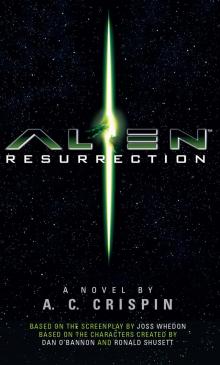 Alien Resurrection
Alien Resurrection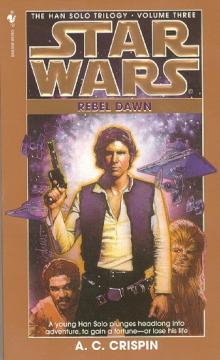 Star Wars - The Han Solo Trilogy - Rebel Dawn
Star Wars - The Han Solo Trilogy - Rebel Dawn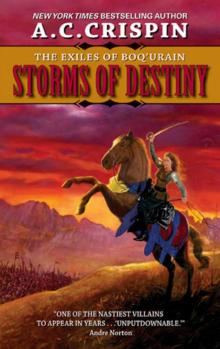 Storms of Destiny
Storms of Destiny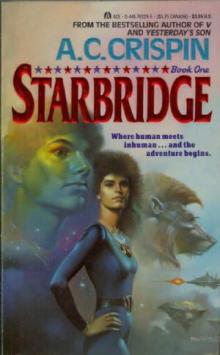 Starbridge
Starbridge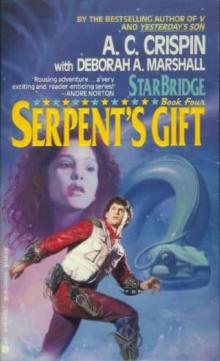 Serpent's Gift
Serpent's Gift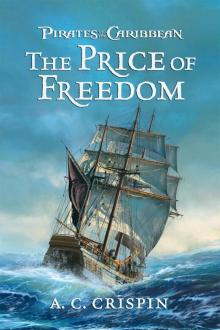 Pirates of the Caribbean: The Price of Freedom
Pirates of the Caribbean: The Price of Freedom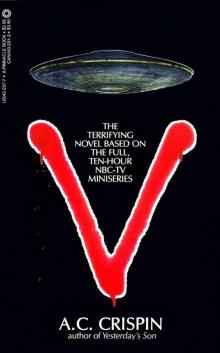 V01 - V
V01 - V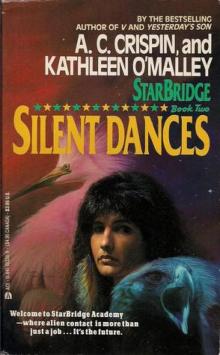 Silent Dances
Silent Dances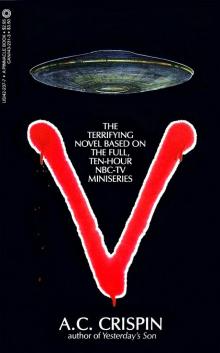 V
V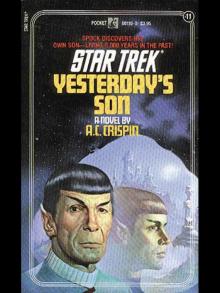 Yesterday's Son
Yesterday's Son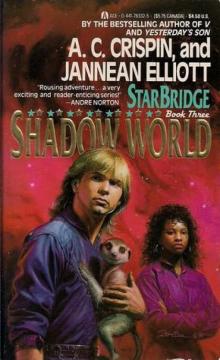 Shadow World
Shadow World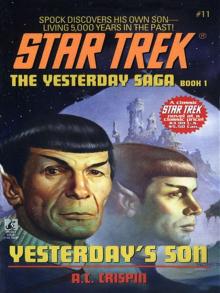 STAR TREK: TOS #11 - The Yesterday Saga I - Yesterday's Son
STAR TREK: TOS #11 - The Yesterday Saga I - Yesterday's Son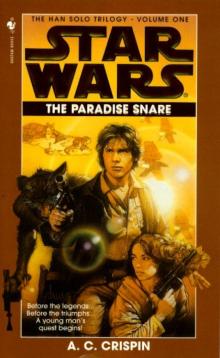 Star Wars - Han Solo Trilogy - The Paradise Snare
Star Wars - Han Solo Trilogy - The Paradise Snare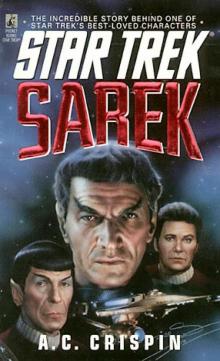 Star Trek - Sarek
Star Trek - Sarek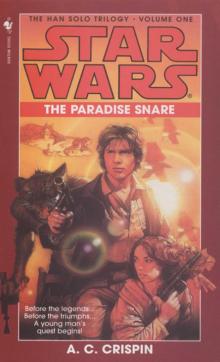 Star Wars: The Han Solo Trilogy I: The Paradise Snare
Star Wars: The Han Solo Trilogy I: The Paradise Snare